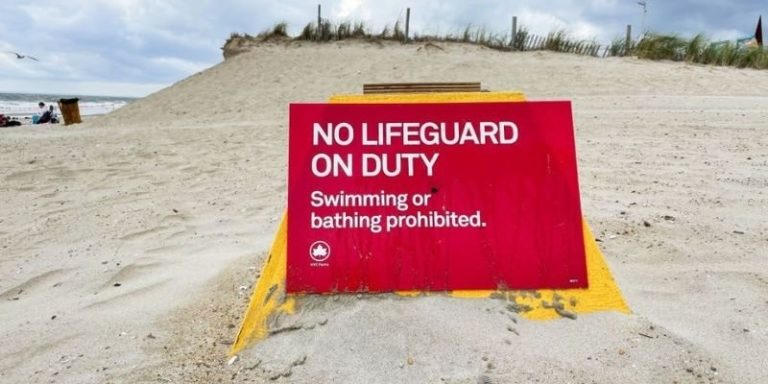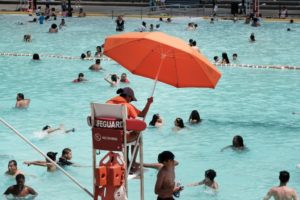Lifeguard Shortage Could Limit Summer Swimming
Pools, beaches, and lakes across the US are struggling to deal with a short supply of staff.
By: Laura Valkovic | June 1, 2022 | 759 Words

(Photo by Noam Galai/Getty Images)
Summer is here, which means kids and adults across the U.S. are probably planning to spend lots of time at beaches or their local swimming pools over the next few months. Some areas may have to endure limited pool time, though. Since the COVID-19 pandemic, lots of things have been in short supply – from certain foods to airplane staff. One problem, however, may affect kids’ summer plans this year – a shortage of lifeguards.
Pools, lakes, and beaches are great places to cool off in the hot weather, but without enough lifeguards to make sure people are safe around the water, some locations can’t open their facilities. Other places have said they will open for swimming, but with shortened hours.
Why Have Lifeguards?

(Photo by Spencer Platt/Getty Images)
Lifeguards perform an important job when it comes to water safety. According to the website Career Explorer, “Lifeguards are expert swimmers who work at almost any location where people swim. They know how to save a person who is drowning or who has sustained an injury while swimming, and they can give artificial respiration [helping people to breathe using a method such as mouth-to-mouth resuscitation] if required.”
A Shortage of Staff
According to the American Lifeguard Association, only about half of the nation’s lifeguard jobs are filled right now. One official, Kenneth Allen of Houston Parks & Recreation, suggested that COVID lockdowns made it harder to find candidates for the job. He said that half of the lifeguards would return to the job each summer before the pandemic, but “After we closed for two years, and tried to come back, most of that returning staff were gone.”
So why is there a problem recruiting people for the job? Some of the issues could be:
- Training and certification can be expensive.
- The work is seasonal – meaning many of the jobs are only offered for the summer.
- The wages are not very high.
- Many lifeguards are teens and young people, who may not want a summer job after the pandemic lockdowns.
In Raleigh, North Carolina, one official said the job also requires a high fitness level. “It’s kind of physically demanding. You have to be able to swim, you have to be able to go 300 yards without stopping. You have to tread water for a few minutes and you need to be able to pull a 10 pound block off the bottom of the pool,” he said.
Raleigh has had to delay opening some pools due to the issues, and is limiting the number of swimming lessons it can offer the public.
To fix the problem, a number of cities are offering people a bonus to get training and learn the skills needed to be a lifeguard. Houston is offering a $300 bonus for applicants, while Chicago is giving $500 to new lifeguards.
Houston is one place that has suffered from the shortage – swimmers in the city were disappointed to find that pools were closed over the recent Memorial Day weekend. According to the city, the lack of lifeguards means local pools will have to rotate their opening hours so that some will only open on the weekends, and others on weekdays.
In Philadelphia, the Parks and Recreation Department has been trying to recruit more lifeguards by offering them higher wages and paying for their certification, as well as advertising on social media. “They’re the lifeblood of a community in the summertime,” said local official Bill Salvatore. “The good news is we’re further along than we were last year … If we get another 60 or 70 lifeguards, we’ll feel really good about it.” The department says that if they get the extra staff, the city can open 65 pools this season.
Safe Swimming
Some have expressed concern that the shortage will cause more injuries and deaths this summer as people swim in dangerous areas, especially beaches and some lakes with rip currents that can carry people away from shore. Here are a few tips for staying safe in the water this summer:
- Get familiar with beach warning flags and their meanings in your area.
- Check water temperatures, as cold water can affect your breathing, heart rate, and blood pressure.
- If swimming at the pool, check what equipment is around, as well as the position of handrails, and so on.
- Research your local area to find out what hazards may be at the lakes and beaches, or to find out when lifeguards are on duty.
- Never swim alone.
















